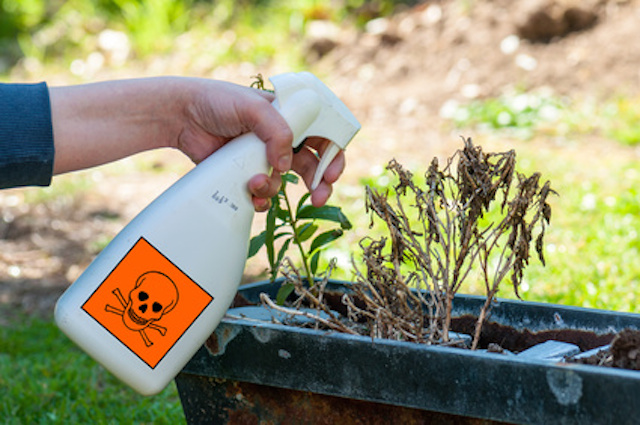The most commonly used weed-killing spray Roundup was recently labeled as “probably cancer-causing to humans” by the World Health Organization. Now, the first study of its kind reveals that the Roundup herbicide triggers antibiotic resistance.
According to the Alliance for the Prudent Use of Antibiotics (APUA): “Antibiotic resistance occurs when an antibiotic has lost its ability to effectively control or kill bacterial growth; in other words, the bacteria are “resistant” and continue to multiply in the presence of therapeutic levels of an antibiotic.”
In the study, the research team found that common herbicides may alter pathogens to become more easily resistance to antibiotics.
The study included Roundup, which was shown to increase antibiotic resistance to bacteria such as E. coli and salmonella.
As Rodale News reported: “The way Roundup causes this effect is likely by causing the bacteria to turn on a set of genes that are normally off, [study author] Heinemann says. ‘These genes are for ‘pumps’ or ‘porins,’ proteins that pump out toxic compounds or reduce the rate at which they get inside of the bacteria… Once these genes are turned on by the herbicide, then the bacteria can also resist antibiotics. If bacteria were to encounter only the antibiotic, they would instead have been killed.
In a sense, the herbicide is ‘immunizing’ the bacteria to the antibiotic…This change occurs at levels commonly used on farm field crops, lawns, gardens, and parks.”
The study authors conclude: “Increasingly common chemicals used in agriculture, domestic gardens, and public places can induce a multiple-antibiotic resistance phenotype in potential pathogens. The effect occurs upon simultaneous exposure to antibiotics and is faster than the lethal effect of antibiotics.
The magnitude of the induced response may undermine antibiotic therapy and substantially increase the probability of spontaneous mutation to higher levels of resistance.
The combination of high use of both herbicides and antibiotics in proximity to farm animals and important insects, such as honeybees, might also compromise their therapeutic effects and drive greater use of antibiotics.
To address the crisis of antibiotic resistance requires broadening our view of environmental contributors to the evolution of resistance.”
Antibiotic resistance has become an epidemic in the United States and across the world. “If resistance to treatment continues to spread, our interconnected, high-tech world may find itself back in the dark ages of medicine, before today’s miracle drugs ever existed,” the APUA states.
The study showing that the Roundup herbicide triggers antibiotic resistance was published in the journal MBio.
Note: None of the information in our website is intended to diagnose, treat, cure or prevent any illness or disease. The content on our website is for educational purposes only.
DON’T FORGET to sign up for our weekly newsletter to get our latest articles, updates, free recipes and giveaways.
WHO labels Monsanto’s glyphosate as possible carcinogen.
Costco is working to ban antibiotics from meat.
Wendy’s removes soda from kid’s meals.
Burger King to remove soda from kid’s meals.
What you need to know about antibiotic resistance.
Rivers and antibiotic resistance: Is there a connection.
McDonalds removes antibiotic from chicken.
REFERENCES:
1. “Research Reveals Herbicides Promote Antibiotic Resistance.” Mercola.com. Mercola.com, 7 Apr. 2015. Web. 07 Apr. 2015.
2. “Popular Weedkiller Tied to Antibiotic Resistance.” Rodale News. Rodale News, 23 Mar. 2015. Web. 07 Apr. 2015.
3. “Sublethal Exposure to Commercial Formulations of the Herbicides Dicamba, 2,4-Dichlorophenoxyacetic Acid, and Glyphosate Cause Changes in Antibiotic Susceptibility in Escherichia Coli and Salmonella Enterica Serovar Typhimurium.” American Society for Microbiology. MBio, 24 Mar. 2015. Web. 07 Apr. 2015.
4. “What Is Antibiotic Resistance and Why Is It a Problem?” Alliance for the Prudent Use of Antibiotics. Alliance for the Prudent Use of Antibiotics, n.d. Web. 07 Apr. 2015.

















